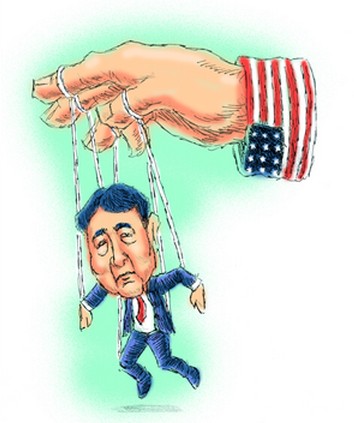

 |
| Illustration: Peter C. Espina |
As of Tuesday, the application deadline for the Asian Infrastructure Investment Bank (AIIB), 48 countries and regions in five continents have applied for membership, 30 of which have been appointed as prospective founding members. This financial institution seems to have earned a worldwide support even before it is officially established. However, the AIIB's popularity has caused embarrassment to the US and Japan, who have awkwardly discovered that they are the last holdouts among the major economies.
If there is any epigram to characterize what Washington and Tokyo have gone through in the past few weeks, it is Murphy's Law - anything that can go wrong, will go wrong. It seems suitable to describe how the US-led front, which aims at a Western unified passive resistance against the AIIB, has been breached from inside, as the UK, US' most loyal ally, decided to fulfill a pragmatic vision in mid-March by joining the AIIB. Sooner than expected, the front collapsed.
When the deadline approached, Japan also wavered. According to the Financial Times, Japanese Ambassador to China Masato Kitera told the newspaper that Japan would seek membership in the AIIB by June. However, the statement was soon denied by Japanese Foreign Minister Fumio Kishida, and the country's Finance Minister Taro Aso reaffirmed that Japan remains cautious about the prospect of the institution.
Contradictory statements from high-ranking government officials only demonstrate Japan's ambivalence. When the AIIB was proposed, Tokyo, abreast of Washington, thought the institution would only be a joke if major economies give it the cold shoulder. Japan is concerned that the AIIB, if successful, would pose a great challenge to the Japan-led Asian Development Bank (ADB).
However, the dramatic changes in the past two weeks are pushing Japan to have second thoughts: On the one hand, it is unwilling to join the rivaling bank as a reinforcement, even at the cost of losing the status as a founding member; On the other hand, it has been aware that since the "foe" cannot be defeated, it might as well join it, or Japan will only risk being marginalized.
Sandwiched between strong calls at home for joining the AIIB and the US pressure of not to join, Japan is trying to adjust its strategy. Tokyo has released nebulous signals to show it won't reject being part of the new bank, but it also has to parrot what the US keeps saying. It won't make a decision until the AIIB presents to the world a desirable architecture, especially a transparent decision-making mechanism.
The total number of founding members will be confirmed on April 15, and a final meeting before the AIIB's establishment will be convened in May, so Japan's attitude may be variable in the next one or two months. Japan will keep an eye on the preparatory work of the AIIB, and meanwhile struggle to keep pace with the US.
Its strong desire to reinvigorate its economy by transferring infrastructure capacity will make it realize that the AIIB could be a massive catalyst to its endeavor.
But it has to share a consistent stance with the US because when the revision of the Guidelines for US-Japan Defense Cooperation arrives, Japan wants to trade its holdout in the AIIB for the explicit inclusion of the Diaoyu Islands in a new treaty.
However, there has already been bad blood between Tokyo and Washington. Japanese Prime Minister Shinzo Abe's nationalist shift has caused quite a few inconveniences to the US, which is worried about losing its tight grip on Japan.
UK's "turning back" has set an example to Japan that in the face of real interests, pragmatism will prevail. After weighing and balancing, Japan will be likely to break ranks with the US, especially when it realizes that Asia's massive need for infrastructure and capital is way beyond what the AIIB and ADB can offer even combined. In this sense, the AIIB will be more of a partner to the ADB instead of a competitor.
The article was compiled by Global Times reporter Liu Zhun based on an interview with Zhou Yongsheng, a professor of Japanese studies at China Foreign Affairs University. liuzhun@globaltimes.com.cn
 J-11 fighters in air exercise
J-11 fighters in air exercise Beauties dancing on the rings
Beauties dancing on the rings Attendants-to-be join Mr. & Miss Campus Contest
Attendants-to-be join Mr. & Miss Campus Contest Beijing's toughest anti-smoking law takes effect
Beijing's toughest anti-smoking law takes effect Family lives in cave for about 50 years in SW China
Family lives in cave for about 50 years in SW China PLA soldiers operating vehicle-mounted guns in drill
PLA soldiers operating vehicle-mounted guns in drill Blind carpenter in E China's Jiangxi
Blind carpenter in E China's Jiangxi China hosts overseas disaster relief exercise for the first time
China hosts overseas disaster relief exercise for the first time 20 pairs of twins who will become flight attendants in Sichuan
20 pairs of twins who will become flight attendants in Sichuan Obama is sowing discontent in S.China Sea
Obama is sowing discontent in S.China Sea Rescuers work through night to reach cruise ship survivors
Rescuers work through night to reach cruise ship survivors Driving through limbo
Driving through limbo Facing down MERS
Facing down MERSDay|Week